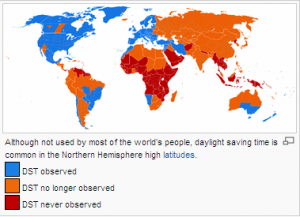http://www.mnn.com/green-tech/research-innovations/stories/do-we-still-need-daylight-saving-time
As long ago as 1897, countries around the world began instituting daylight saving time, adding an hour of sunlight to the afternoon. This meant communities could be more productive — people could work longer, and when work was done it was still bright enough to run errands and stimulate the economy. The added daylight also meant more exposure to Vitamin D and the added time for people to exercise outdoors.
Everyone from factory owners to retailers embraced the change. Even the candy lobby supported the new system, figuring the extra hour of sunlight meant it would be safer for kids to go trick-or-treating on Halloween.
“It has several technical benefits as well,” Dr. David Prerau, author of “Seize the Daylight: The Curious and Contentious Story of Daylight Saving Time,” explained during a phone interview. “It’s been found to reduce energy usage by doing something called load smoothing” — separating out electrical loads throughout the day to better deal with the valleys and peaks of energy usage — “and so you’re going to generate energy more efficiently and therefore have less effects on pollution.” A study by the U.S. Department of Transportation showed that the country’s electricity usage is cut by 1 percent each day because of daylight saving time.
But not everyone is on board with the time shift.
. . .
Is daylight saving time a fait accompli or will time ever just stand still? Downing doesn’t see a light at the end of the tunnel. “Since 1966, every 20 years, Congress has given us another month of daylight saving. We’re up to eight months now,” he says. “And there is every reason to believe that the [U.S.] Chamber of Commerce, the national lobby for convenience stores — which account for more than 80 percent of all gasoline sales in the country — and Congress will continue to press for extensions until we adopt year-round daylight saving. And then, why not spring forward in March or April and enjoy double daylight saving time?”
background: http://www.webexhibits.org/daylightsaving/c.html
Only a minority of the world’s population uses DST because Asia and Africa generally do not observe it 

